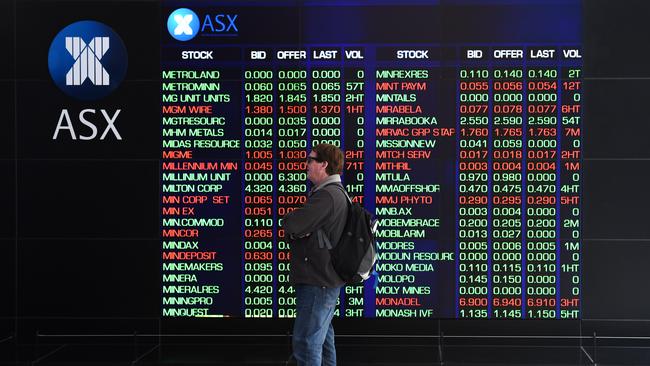Australia’s super funds turn negative in August amid market volatility
The median balanced option delivered a return of minus 0.5 per cent in the month, driven by losses across developed markets.
The nation’s super funds turned negative in August as markets were hit by central banks’ efforts to dampen rampant inflation.
The median balanced option delivered a return of minus 0.5 per cent in the month, driven by losses across developed markets, according to research house SuperRatings.
It comes after funds swung to a positive performance in July, with a short-lived a recovery in equity markets boosting returns after a volatile June.
The 12-month return illustrates the challenge facing the nation’s biggest investors: the median balanced option returned minus 3.8 per cent for the year through to August 31, while the median growth option returned minus 4.8 per cent.
Over the month, the median growth fund returned minus 0.4 per cent.
SuperRatings executive director Kirby Rappell said investment performance in the month was hit by higher interest rates across developed markets.
“Over the month of August we have seen a slight pullback in the strong recovery in returns we saw in July. While it is a small negative result this month, this reflects the volatility across investment markets, with elevated inflation levels continuing to pose challenges across markets,” he said.
“Another interest rate rise impacted investment returns, though the silver lining here is that this may benefit retirees who are deriving an income from their pension accounts through exposure to cash.”

Central banks have been pushing through rate hikes for months in a bid to get inflation under control.
The Reserve Bank has hiked five times in as many months, pushing the cash rate from its ultra-low 0.1 per cent to 2.35 per cent to dampen demand and keep a lid on rising prices.
Economists are expecting the central bank to hike at least a couple of more times in this cycle, bringing the cash rate above 3 per cent.
Meanwhile, central banks in the US and Europe have been on a similar path to get inflation back to target, to little avail.
Inflation in the US is tracking above 8 per cent, while in Europe it sits at 9 per cent. Australia’s inflation rate is about 6 per cent.
Central banks’ interest rate push has spurred volatility in markets, pushing the local sharemarket down 15 per cent between April and mid-June, before it climbed 10 per cent in July. It gave up a portion of those gains in August.
The negative median return in August comes weeks after performance test results revealed the ‘dud’ funds not delivering for their members.
The Australian Prudential Regulation Authority’s latest annual performance test showed that five funds failed this year, with MySuper offerings from Australian Catholic Super, Westpac’s BT Super, Energy Industries Superannuation Scheme and AMG Super all now barred from taking on new members after failing for the second year in a row.
The Westpac Group Plan MySuper product notched up a first-time fail result this year.
All up, these dud funds manage $28bn in retirement savings for more than 500,000 members.
The performance test was brought in a little over a year ago as part of the Your Future, Your Super reforms established by the Morrison government. But Labor has already flagged the need for change, kicking off a review of the regime, including into whether its measures are affecting funds’ risk-taking behaviour.
As funds warn of the challenging medium-term outlook for investment returns, critics of the performance test have warned that it will lead to index hugging and will discourage infrastructure and sustainability-related investment.
Mark Delaney, the chief investment officer of the nation’s largest super fund, the $250bn AustralianSuper, has in recent months predicted lower returns and a more challenging investing environment for the next decade.






To join the conversation, please log in. Don't have an account? Register
Join the conversation, you are commenting as Logout